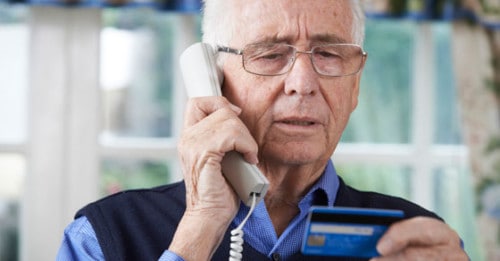This information was accurate as of 4/13/20.
 The Coronavirus (COVID-19) pandemic may pose a double whammy for seniors. The elderly are considered the most vulnerable population for medical complications associated with the virus. They’re also prime targets for COVID-19 scams. If you’re a senior — or have elderly relatives and friends — read and share the following information.
The Coronavirus (COVID-19) pandemic may pose a double whammy for seniors. The elderly are considered the most vulnerable population for medical complications associated with the virus. They’re also prime targets for COVID-19 scams. If you’re a senior — or have elderly relatives and friends — read and share the following information.
Everyone a Potential Victim
There’s nothing new about fraud perpetrators attacking seniors, who may be less savvy about phishing emails and online scams and more trusting of strangers. As a study conducted by the FINRA Investor Education Foundation and several other groups found, a major risk factor for losing money to scams is social or physical isolation, which is more common among the elderly.
Of course, during the current crisis, everyone’s a potential fraud victim. As with all consumers, seniors should watch out for:
- Emails promoting vaccines and cures that contain malware-laced attachments,
- Fake charities soliciting donations,
- Scams that promise high returns for investing in COVID-19-related stocks, and
- Requests for personal information or a fee to receive an economic impact payment from the federal government.
Senior Benefit Scams
Some scams are tailor-made for older Americans. For example, the nonprofit Senior Medicare Patrol warns that perpetrators are contacting Medicare recipients and offered sham COVID-19 tests and treatments in exchange for Medicare numbers or money. It’s important to remember that actual government agencies will never call and ask for personal or payment information. As Medicare.gov instructs, “if someone calls asking for your Medicare Number, hang up!”
With local Social Security Administration (SSA) offices temporarily closed, scammers are also trying their luck with benefit payment recipients. The SSA states emphatically that, “any communication that says SSA will suspend or decrease your benefits due to COVID-19 is a scam, whether you receive it by letter, text, email, or phone call.” You can report suspicious contacts at https://oig.ssa.gov.
Other Threats
Fraud perpetrators have also updated several old frauds for the COVID-19 age — including the classic “grandchild” scam. You could receive a phone call claiming that a grandchild is sick or in trouble and needs your help. Fraudsters usually ask for payment via a gift card and instruct you to act fast. Gather facts from the caller, then hang up and verify the information with other relatives. Chances are, your grandchild is just fine.
Also be wary of anyone using the virus to pitch home services. If someone offers to clean and sanitize your home, check the business’s reputation online or with the Better Business Bureau and make sure you don’t pay the service provider until the job is complete. As an extra precaution, you might invite a friend or relative to be with you when cleaners are in your home.
Reporting Crime
This is an anxious time for everyone, but elderly Americans need to be on guard even more than other segments of the population right now. If someone attempts to scam you or a family member, contact law enforcement and, if applicable, the proper government agency. Reporting these crimes is essential to stemming senior-targeted fraud.
© 2020
---
The information contained in the Knowledge Center is intended solely to provide general guidance on matters of interest for the personal use of the reader, who accepts full responsibility for its use. In no event will CST or its partners, employees or agents, be liable to you or anyone else for any decision made or action taken in reliance on the information in this Knowledge Center or for any consequential, special or similar damages, even if advised of the possibility of such damages.